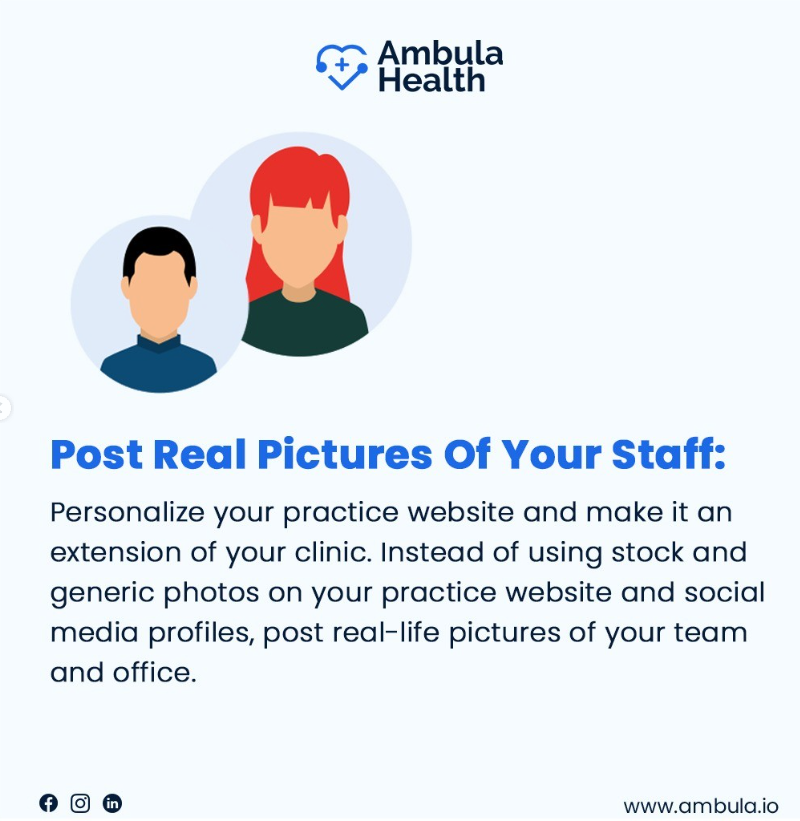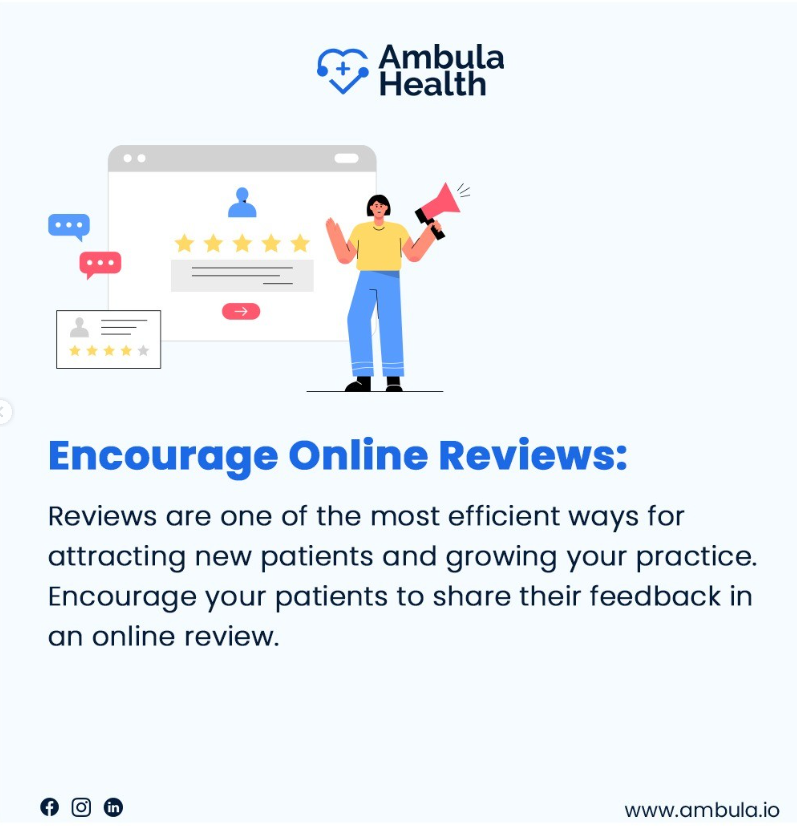How to get more patients with healthcare SEO

Physicians can effectively improve their healthcare SEO marketing and attract more local patients. By understanding their target patient audience, optimizing their website, following best practices, and continuously measuring and improving results, they can stay ahead of the competition and provide the best possible care to their patients.
What is healthcare search engine optimization (SEO)?
Healthcare search engine optimization (SEO) is the process of optimizing a healthcare website and its content to improve its visibility and ranking in search engine results pages (SERPs). This medical search engine optimization is crucial for increasing online presence.
Healthcare SEO aims to increase the organic reach results and the number of relevant and targeted visitors to a website through Google, Bing, and Yahoo. Most search engine users focus on the first page, so you want to ensure you’re there! Effective SEO for healthcare industry practices can help achieve this goal.
The process of healthcare SEO involves several technical and creative elements, including keyword analysis, on-page optimization, off-page optimization, and content creation. Utilizing these SEO techniques can significantly enhance a website’s performance.
By using these elements, healthcare organizations can improve their website’s visibility and rank in search results for relevant keywords and phrases related to their services, treatments, conditions, and more. Effective SEO for healthcare providers and hospitals can lead to better online engagement.
This research is an essential part of healthcare SEO. It helps healthcare organizations understand what terms and phrases their target audience is searching for and what topics they are interested in, thereby aligning with user intent and search intent.
On-page optimization involves optimizing elements within the website, such as title tags, meta descriptions, and header tags, to ensure the website is structured and optimized for search. This on-site SEO process also includes content optimization and the use of alt tags.
Off-page optimization involves building backlinks and improving the website’s reputation and authority.
Finally, content creation plays a crucial role in healthcare SEO, as it provides these engines with information about the website and its services and helps to engage and educate visitors. High-quality content that is both engaging and accurate is essential.
Content can include blog posts, articles, infographics, videos, and more and should be optimized for search and patients. Effective content optimization ensures that medical content remains high-quality and relevant.
By implementing healthcare SEO best practices and regularly monitoring and adjusting their efforts, healthcare organizations can improve their online visibility and attract more targeted traffic to their website, ultimately leading to more patient leads and conversions. Strategic healthcare SEO marketing and patient acquisition efforts are key to success.
How do search engines work?
Search engines function like complex information retrieval systems in three stages. First, they dispatch web-crawling bots to scour the internet, following links like digital spiders to discover new web pages. These discovered pages are then analyzed and stored in a giant index, like a library catalog for the web. Finally, when you enter a search, the engine digs into this index, using clever algorithms to retrieve the most relevant and useful webpages based on your query.
What work is needed for SEO?
To boost a physician’s website ranking and visibility to new patients, several tasks must be done effectively to improve its search engine optimization (SEO). Here are the key elements involved in optimizing the website for healthcare practices, including effective healthcare SEO marketing strategies.
Research
This involves identifying keywords and phrases that patients might use when searching for medical services related to the physician’s specialty. This information can then be used to optimize the website’s content, meta tags, and other elements, ensuring alignment with user intent and keyword performance.
Website optimization
This involves optimizing various elements within the website, such as the title tags, meta descriptions, header tags, and content, to ensure that they are structured and optimized for search. On-site SEO also emphasizes mobile responsiveness and fast loading pages, as site speed plays a significant role in a page’s core web vitals.
This helps Google and patients searching online understand what the website and its pages are about, which can improve its ranking for medical sites. Effective SEO for medical websites involves thorough content optimization to enhance search visibility.
Educational Blog Posts in Healthcare SEO
Educational blog posts are a cornerstone of a successful healthcare SEO strategy. They serve multiple purposes: informing patients, building trust, and improving search engine rankings. These blog posts should focus on topics that are relevant to the medical field and of interest to your target audience.
Providing Valuable Information
The primary goal of educational blog posts is to provide patients with valuable information. This includes explaining common medical conditions, discussing treatment options, and offering preventive care tips. For example, a post titled “Understanding Type 2 Diabetes: Symptoms, Treatments, and Lifestyle Changes” can help patients better understand their condition and how to manage it effectively. Such posts not only educate patients but also position your practice as a reliable source of medical information.
Establishing Authority
By consistently publishing well-researched and informative content, healthcare providers can establish themselves as authorities in their respective fields. When patients see that practice regularly shares expert knowledge, they are more likely to trust that practice with their healthcare needs. This trust can translate into higher patient retention and an increase in new patient inquiries. Authority is also a critical factor in SEO, as search engines tend to rank authoritative content higher in search results.
Other SEO strategies
This involves building backlinks and improving the website’s reputation and authority in the eyes of Google search. Off-site SEO techniques, such as link building and directory listings, can help improve the ranking in search results, as they signal to search engines that the website is trustworthy and provides valuable information.
By implementing these SEO best practices, a physician’s website can improve its visibility and ranking in search results, attracting more targeted traffic and patients. It’s essential to regularly monitor and adjust the website’s SEO efforts to ensure that it continues to perform well in search results and adapt to any changes in search algorithms or the healthcare industry, a key aspect of healthcare SEO marketing.
How to implement SEO into healthcare websites?
Let’s work on the best practices for healthcare SEO and how physicians can improve their website’s visibility and ranking in search results, attract targeted traffic, and ultimately generate more patient leads. Effective SEO strategies are crucial for healthcare SEO marketing.
Conduct keyword research
The first step in optimizing a physician’s website for search engines is conducting keyword research to identify keywords and phrases that patients might use when searching for medical services related to the physician’s specialty. This information can then be used to optimize the website’s content, meta tags, and other elements, ensuring alignment with user intent and search intent.
Keywords should revolve around what health services the provider or a healthcare organization offers.
Optimize on-page elements
This involves optimizing various elements within the website, such as the title tags, meta descriptions, header tags, and content, to ensure that they are structured and optimized for search engines. On-site SEO and content optimization techniques help these engines understand what the website and its pages are about, which can improve its ranking in the search results.
This will help search engines crawl your keyword to the first page.
Create high-quality, relevant content.
Creating high-quality, relevant, and informative content is essential for search engines and patients. This content can include blog posts, articles, infographics, and more and should be optimized for search engines and users, ensuring it remains engaging and accurate.
The Importance of Backlinks in Healthcare SEO
Backlinks act as endorsements from other websites, signaling to search engines that your content is valuable and trustworthy. In the context of healthcare, where trust and authority are paramount, acquiring backlinks from reputable sources can significantly boost your online reputation. When a well-respected medical journal or local health organization links to your site, it not only drives referral traffic but also improves your site’s domain authority, making it more likely to appear at the top of search engine results pages (SERPs).
Strategies for Building High-Quality Backlinks
- Publish High-Quality, Informative Content:
- Educational Articles and Blog Posts: Create in-depth articles and blog posts on relevant health topics that demonstrate your expertise. For instance, an article on “The Latest Advances in Cardiac Care” can attract links from other medical websites, health bloggers, and even news outlets.
- Research and Case Studies: Conduct original research or publish case studies related to your specialty. Such content is often cited by other healthcare professionals, researchers, and medical institutions, generating valuable backlinks.
- Guest Blogging and Contributions:
- Write for Medical Journals and Health Blogs: Contributing articles to respected medical journals or health blogs can establish you as a thought leader in your field. Ensure that your contributions include a link back to your clinic’s website, preferably within the author bio or body of the article.
- Collaborate with Health Influencers: Partner with health influencers and bloggers who can write about your clinic or services. Their endorsement and links can drive significant traffic and enhance your clinic’s credibility.
- Local Partnerships and Sponsorships:
- Engage with Local Health Organizations: Build relationships with local health organizations, hospitals, and community health programs. These entities often have websites with high domain authority, and collaborating with them can lead to backlinks from their sites.
- Sponsorship Opportunities: Sponsor local health events, seminars, or community programs. Event organizers typically acknowledge sponsors on their websites with a link, providing an excellent backlink opportunity.
Optimize for local searches.
This involves optimizing the website for local terms and ensuring that the website’s Name, Address, and Phone Number (NAP) information is consistent across the web. This can improve the website’s visibility in search traffic results, making it easier for patients in the area to find the physician’s office through directory listings and online reviews.
What is Local SEO?
Local SEO is a type of search engine optimization (SEO) focused on optimizing a website for local search terms and improving its visibility to patients in communities where healthcare providers and a healthcare business give care. This is especially important for medical practices, such as a physician’s office, that serve a specific geographic area and want to attract local patients through effective SEO for medical practices.
This can help a physician’s medical practice in several ways:
- Increased visibility: By optimizing healthcare websites for local terms and ensuring that the website’s Name, Address, and Phone Number (NAP) information is consistent across the web, the physician’s office can improve its visibility in local results, making it easier for patients in the area to find the office through online reviews and directory listings.
- More targeted traffic: By optimizing the website for local terms, the physician’s office can attract more targeted traffic from patients in the area actively searching for medical services related to the physician’s specialty, enhancing patient acquisition efforts.
- Improved trust and credibility: By providing accurate and consistent NAP information across the web and ensuring that the website is optimized for local, the physician’s office can improve its trust and credibility in the eyes of both search engines and patients through effective reputation management and online reviews.
- Increased patient leads: By improving its visibility, attracting more targeted traffic, and improving its trust and credibility, the physician’s office can generate more patient leads, resulting in more appointments and increased revenue through effective lead generation and patient acquisition strategies.
Implementing this can help a physician’s medical practice attract more local patients and improve its visibility, trust, and credibility in the eyes of both search engines and online visitors. This can result in increased patient leads and revenue for the office through effective healthcare SEO marketing.
What are the best practices for Local SEO strategy?
As part of your healthcare SEO strategy, follow the best practices so that Google can make it easier for your patients to find you. Start by doing the following SEO strategies for healthcare providers:
- Claim and verify your Google My Business listing: The first step in taking advantage of local SEO is to claim and verify your Google My Business listing, which allows you to control the information that appears about your business in Google Maps and local results. This information includes your business name, address, phone number, website, and photos, which can be enhanced through directory listings and online reviews.
- Optimize your Google My Business listing: Once your Google My Business listing is claimed and verified, it’s essential to optimize it by providing accurate and up-to-date information about your business, including your business name, address, phone number, and website. You should also add photos, business hours, and a description of your services to help potential patients understand what you offer. This helps Google understand that your healthcare organization is still relevant and current, which is crucial for effective directory listings and reputation management.
- Encourage patient reviews: Patient reviews play a significant role in any medical SEO strategy. They can help improve your business’s visibility, credibility, and reputation in the eyes of both search engines and potential patients. Encourage your patients to leave online reviews on your Google My Business listing and other relevant platforms, such as Healthgrades or Yelp. This is a key aspect of reputation management and patient acquisition.
Use local keywords in your website’s content: Incorporate relevant local keywords into your website’s content, such as the name of your city, neighborhood, or area, to help improve your website’s visibility in local search engine traffic. This on-site SEO strategy is essential for effective content optimization.
Build local backlinks: Build backlinks from relevant and trustworthy local websites, such as local news outlets, chambers of commerce, and other healthcare-related organizations, to help improve your website’s authority and reputation in the eyes of search engines. This off-site SEO tactic is crucial for effective link building and reputation management.
How to monitor search engine results
Once you start implementing your healthcare SEO strategy, you will notice that you will get a ranking on the search engine results page. It is crucial to monitor your organic search results to ensure your SEO strategies are effective and your healthcare SEO marketing efforts are paying off.
There are several ways to monitor the results from a physician’s healthcare SEO strategy, including website performance tracking and analyzing keyword performance.
- Google Analytics: Google Analytics is a free web analytics tool that allows you to track and analyze the performance of your website. This includes information on website traffic, source of traffic, and keyword rankings. By monitoring your website’s performance in Google Analytics, you can see how your healthcare SEO affects your website’s traffic and rankings. This is an essential part of website performance tracking and conversion tracking.
- Use Google Search Tools: Google Search Console is a free tool that provides information on your website’s performance in Google and other search engines’ search results. This includes information on which keywords your website ranks for and any technical SEO issues affecting your website’s visibility and performance. Utilizing these on-site SEO techniques is crucial for comprehensive website performance tracking.
- Search engine traffic ranking reports: Several paid and free tools are available to track your website’s performance in organic traffic results. These reports can provide valuable insights into how your website ranks for local keywords and information on the websites ranking above you. Effective website performance tracking and analyzing keyword performance are essential components of successful SEO strategies.
- Patient reviews: Monitoring patient reviews can provide valuable insights into how your healthcare SEO efforts affect your reputation and visibility in the eyes of potential patients. This includes monitoring online reviews on your Google My Business listing and other relevant platforms like Healthgrades or Yelp. This is a crucial aspect of reputation management and patient acquisition.
By monitoring these metrics and making data-driven decisions based on the results, healthcare providers can effectively track website performance and evaluate their healthcare SEO strategy. This allows for necessary adjustments to improve their results and overall SEO strategies.
Why do healthcare businesses focus on SEO?
Healthcare businesses focus on SEO because it is a great way to acquire patients when they are actively looking for specific services. Other marketing efforts can help build awareness over time, but SEO for healthcare providers is a great strategy to bring patients to your door when they need it the most, enhancing lead generation.
How can Ambula Health help?
At Ambula Health, we understand the importance of a solid online presence in today’s digital world. We offer healthcare SEO services to help doctors grow their practice and reach new patients. We work with various healthcare businesses, healthcare facilities, and medical organizations. Our marketing department is a leader in providing marketing automation, reaching out to existing consumers and past patients, making us a top healthcare SEO agency.
Reach out to one of our team members, and we would be happy to help with our healthcare SEO services. As a leading healthcare SEO consultant, we are here to assist you.







